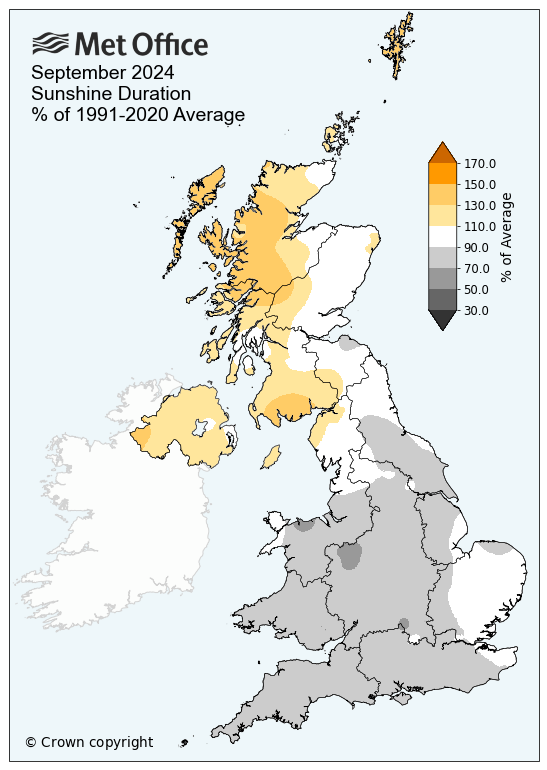
A Century-Old Record Broken
The Met Office has confirmed that September 2024 saw more rainfall across southern England than any other September since 1911. Over the past few weeks, the region has been lashed by relentless downpours, with some areas receiving up to double the average amount of rainfall for this time of year. The unexpected deluge has shattered long-standing weather records, leaving meteorologists and residents alike astonished.
“This has been an extraordinary month for rainfall,” said a spokesperson from the Met Office. “We have seen unprecedented levels of rain across much of southern England, breaking records that have stood for more than a century.”
While some areas in the southeast, such as Kent and Sussex, have been hardest hit by the rain, the effects have been felt across the entire region. Cities like London, Southampton, and Brighton have all reported severe flooding, with road closures, rail disruptions, and significant damage to infrastructure. For many, this extreme weather is a worrying sign of how unpredictable climate patterns are becoming.
The Impact of the Torrential Rain
The impact of this record-breaking rainfall has been devastating for many communities in southern England. Rivers and streams have burst their banks, turning streets into rivers and making it difficult for people to go about their daily lives. In some areas, homes and businesses have been flooded, leading to significant property damage and costly repairs.
Emergency services have been working around the clock to respond to the growing number of flood-related incidents. Firefighters have been called out to pump water from homes, and local authorities have been distributing sandbags to help protect properties from further damage. Despite these efforts, many residents are still dealing with the aftermath of the extreme weather.
In addition to the flooding, the rain has also caused widespread travel disruption. Trains have been delayed or canceled due to waterlogged tracks, and many major roads have been closed due to flooding. Commuters have faced long delays and frustrating journeys, with many opting to work from home to avoid the chaos. For those who rely on public transport, the disruptions have made it difficult to travel to work or attend appointments.
The Role of Climate Change
As the region grapples with the fallout from the wettest September in over a century, many are questioning whether this extreme weather is a sign of things to come. Climate experts have long warned that the UK is likely to experience more frequent and intense storms, flooding, and rainfall as a result of climate change, and this September’s record-breaking rainfall is seen by some as a stark reminder of that reality.
“While we can’t attribute any single weather event directly to climate change, there’s no doubt that we are seeing more extreme and unpredictable weather patterns,” said Dr. Hannah Mitchell, a climate scientist at the University of Reading. “What we’ve seen in southern England this month is a prime example of how climate change can intensify weather events, leading to increased rainfall and a higher risk of flooding.”
The UK government has acknowledged the growing threat posed by climate change and has pledged to take action to mitigate its effects. However, with more extreme weather events becoming increasingly common, there are concerns that the country’s infrastructure may not be equipped to handle these changes.
More Rain on the Horizon
Unfortunately for residents of southern England, the rain isn’t over yet. The Met Office has warned that more heavy rain is expected in the coming days, with additional weather warnings in place for much of the region. While the rainfall may not be as intense as it has been over the past few weeks, there is still a risk of further flooding, particularly in areas where river levels are already high.
The Met Office has urged residents to remain vigilant and take steps to protect their properties from further damage. “We’re advising people to stay up to date with the latest weather forecasts and to take any necessary precautions,” said a spokesperson. “If you live in an area that’s prone to flooding, make sure you have a plan in place in case the worst happens.”

For many, the prospect of more rain is a daunting one. Communities that have already been hit hard by the flooding are bracing themselves for further disruption, while emergency services continue to work tirelessly to keep people safe. With the ground already saturated and rivers at risk of overflowing, the next few days could prove to be critical in determining the extent of the damage caused by this historic rainfall.
Preparing for Future Storms
As the UK continues to deal with the aftermath of this wet September, there are growing calls for the government to invest in better flood defenses and more resilient infrastructure. Many believe that the country’s current systems are ill-equipped to handle the increasing frequency of extreme weather events, and that more needs to be done to protect homes, businesses, and communities from the threat of flooding.
In response to the growing concerns, the UK government has announced plans to invest in new flood defenses across the country, with a particular focus on areas that are most vulnerable to flooding. “We recognize the need to strengthen our defenses against extreme weather events,” said an official from the Department for Environment, Food and Rural Affairs. “We’re committed to ensuring that communities are better protected from the impacts of flooding and that we are prepared for future storms.”
For now, though, residents of southern England will need to remain vigilant and prepared as the wettest September in over 100 years continues to wreak havoc. With more rain on the way and flood risks still high, it seems that the region is not out of the woods yet. The coming days will be crucial in determining just how much more damage this historic weather event will cause.
Leave a Reply